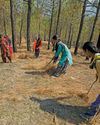
THE PAST few months have been particularly tumultous for Jaiprakash. The 44-year-old resident of Delhi is infected with HIV or the human immunodeficiency virus, for which there is no cure or no vaccine. So Jaiprakash, like most other HIV patients an estimated 40 million people are living with HIV globally, as per the World Health Organization (WHO)-depends on a cocktail of drugs to supress the viral load in his blood. The drugs, known as antiretroviral therapy (ART), delay the progression of the infection into acquired immunodeficiency syndrome (AIDS) and result in fatal consequences. In June, Jaiprakash's doctor changed his treatment regimen to help him better fight the infection. But the art centre run by the National aids Control Office (NACO) for providing free medicines, diagnostic kits and other essentials for those in need, did not have stocks of the prescribed drugs. "Of the three drugs prescribed, the healthcare provider at the art centre gave me only abacavir and lamivudine, that too the paediatric versions. I now take 10 tablets a day instead of one," Jaiprakash tells Down To Earth (DTE). To obtain the third drug, dolutegravir, which who recommends as the "preferred first-line treatment" because of high efficacy and fewer side-effects, Jaiprakash took a desperate step in July.
"Through our support network I learnt that an HIV patient at Delhi's Lok Nayak Jai Prakash Narayan Hospital, who was on the same treatment regimen, died. His drugs were thrown in the garbage bin and I retrieved them," he says.
Jaiprakash knows that the drugs retrieved from the garbage are not going to last long. So since July 21, he has joined about 40 other HIV and AIDS patients in protesting the shortage of ART drugs at NACO's office in New Delhi.
This story is from the {{IssueName}} edition of {{MagazineName}}.
Start your 7-day Magzter GOLD free trial to access thousands of curated premium stories, and 9,000+ magazines and newspapers.
Already a subscriber ? Sign In
This story is from the {{IssueName}} edition of {{MagazineName}}.
Start your 7-day Magzter GOLD free trial to access thousands of curated premium stories, and 9,000+ magazines and newspapers.
Already a subscriber? Sign In

THE CIRCULARITY ARGUMENT
A circular economy can help India achieve its developmental aspirations while following the low-carbon pathway. It will also help address the challenges of waste management, pollution and overexploitation of natural resources. Industries are already innovating to reuse high-volume wastes and have shown that the transition can usher in both environmental and financial windfalls

Banking on flawed drug voluntary licences
The Medicines Patent Pool is pushing for more VLs, but its bad deal with Novartis on a cancer drug shows the pitfalls

Lasting solutions
For the first time, the UN has recognised the role of indigenous communities in tackling aridity. A repository of traditional knowledge India has the wherewithal to lead the way

IMD at 150
India's journey into modern weather forecasting took a decisive turn 150 years ago with the establishment of India Meteorological Department during the British rule. The agency has come a long way since then, shaping the way the country predicts and responds to its diverse climate challenges

Every drop counts
In drought-prone Marathwada region, 14 villages have managed to counter water shortage by budgeting the resource

Threat to survival
Hollongapar Gibbon Sanctuary in Assam faces ecological challenges as railway electrification and hydrocarbon exploration endanger its fragile biodiversity

'Migration is going to be a battlefield'
AMITAV GHOSH is one of the foremost chroniclers of our times. His literary sojourn includes writings on topics that range from languages to climate change to human lives. His latest book, Wild Fictions, brings some of his works on these issues under one title. In a conversation with RAJAT GHAI, Ghosh shares his views on the future of human movement. Excerpts:

Face of future
California wildfires confirm forest fires are intensifying in a hotter world, emitting substantial amounts of greenhouse gases and reinforcing global warming

Friends of the forest
Residents of 30 villages in Uttarakhand establish a model for public participation in saving forests from wildfires

Climate-crazy playbook
Just hours after his second (and final) term began on January 20, US President Donald Trump unleashed 46 presidential actions. Several of these are centred on the US' climate commitments, energy transition, migration and trade policies, and are likely to have negative global implications